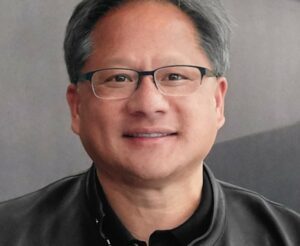
Jensen Huang, co-founder and CEO of Nvidia, solved the 3D graphic challenge for the personal computer in 1999 with the company’s release of the first-ever graphics processing unit (GPU).
Nvidia’s vision for the chips that fueled new video games existed before they had a name for it, Huang said during last week’s Dean’s Speaker Series at Haas.
“It’s OK that you don’t’ have the words to describe it, but you need to know what the company does and for what reason,” said Huang, whose company was named to Time Magazine’s annual list of the 100 most influential companies of 2022.
Nvidia set new standards in visual computing with interactive graphics on tablets, portable media players, and workstations. Its technology has been used in movies like Harry Potter, Iron Man and Avatar and is at the center of the most cutting-edge trends in technology: virtual reality, artificial intelligence and self-driving cars.
Now, Nvidia and other chip-makers’ stock shares are rising over their potential to power OpenAI’s language tool, ChatGPT, a “chatbot” that interacts in a conversational way with users.
(Watch the DSS talk here.)
Huang calls ChatGPT “the iPhone moment of artificial intelligence.”
“When was the last time that we saw a piece of technology that is so versatile that it can solve problems and surprise people in so many ways?” he said. “It can write a poem, fill out a spreadsheet, do a sequel theory, and write Python code. We’ve been waiting for this moment.”
Nvidia is constantly reinventing itself, which is the key for every entrepreneur, he said.
“Creating something out of nothing is a skill that I think every company or startup needs to have,” he said. “The energy of looking for something new – a new way of doing something – is always there.”
Leadership requires both dedication and empathy, he added.
“Being a CEO, being a leader, it’s a craft. You have to dedicate yourself to the craft. I don’t think there’s any easy answer aside from that. You have to have curiosity, you have to have deep empathy for other people’s work.”